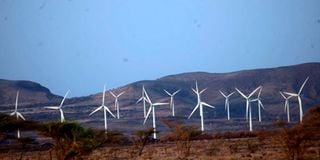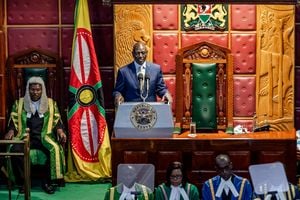MPs want Ketraco probed for Sh18bn loss

Wind turbines at the Lake Turkana Wind Power project in Laisamis, Marsabit County in February 2019.
A parliamentary committee has recommended the investigation of the management of a state agency over a delayed power project that saw taxpayers lose Sh18 billion.
The MPs want the management of Kenya Electricity Transmission Company (Ketraco) probed over the delayed completion of a transmission line connecting the Lake Turkana Wind Power (LTWP) plant to the national grid that saw taxpayers slapped with the hefty fine.
The amount was charged for deemed generated energy, which arises in a situation the plant is available to generate power but unable to deliver to the offtaker’s system.
The National Assembly’s Public Investments Committee (PIC) in a report tabled in the House on Thursday afternoon, wants Ketraco management investigated over contract management and implementation for the project.
The penalty arose from a delay in completing the 428km high-voltage power line from Marsabit to Suswa sub-station in Narok, the main interchange for power from different sources.
The LTWP plant was ready by January 27, 2017 but the transmission line was not completed until September 10, 2018, almost 19-months later.
“The EACC (Ethics and Anti-Corruption Commission) should investigate the Ketraco management on the contract management and implementation of the transmission interconnector, including failure to secure way leaves and signing addenda to the contract that led to delay in the completion of the line and exposed Kenyan taxpayers to Deemed Generated Energy amounting to Sh18, 499,082,672 and higher energy bills,” reads the report.
The committee, at the same time, wants the accounting officers during the time the contract was executed held accountable for not conducting an independent legal risk assessment prior to execution of contracts for a capital project of its magnitude.
“The project was the single largest public private partnership in Kenya and no risk analysis was carried out to establish potential challenges to the project such as delayed construction of the transmission line.
These infractions exposed the government, taxpayers and other partners to value for money and litigation risks for delayed payments to contractors,” reads the report.
In accordance with the terms of the Power Purchase Agreement (PPA) and the government letter of support issued on February 28, 2013, LTWP was entitled to government transmission interconnector delay and deemed generated energy payments from the date of the plant’s completion until the transmission line was operational.
According to the PPA, the government was to construct a new 400kV substation near Loyangalani (initially operated at 220kV), and a 220kV substation near Suswa and all associated works.
LTWP was to finance, design, procure, construct, install, test, commission, operate, maintain and sell net electricity output exclusively to Kenya Power.
Kenya Power, on the other hand, was required to evacuate all net electric power from the LTWP plant once commissioned for a period of 20 years.
In 2008, the 300MW LTWP was identified as a key flagship project of the Kenya Vision 2030 under the energy sector as one of the many power generation projects to meet growing demand.
The wind farm, the largest in Africa, comprises of 365 wind turbines, each with a capacity of 850kW, and a high voltage substation.
In order to avoid such unnecessary penalties, the committee recommends that the government should build the technical and financial capacity of public finance management officers in implementing projects through public private partnerships. This, it said, will enhance efficiency and effectiveness in executing such projects.
The committee has also recommended that the office of the Attorney-General should be involved in drafting and/or reviewing provisions of PPAs before they are signed to ensure terms are competitive and do not disadvantage the Kenyan taxpayers.
The committee noted that currently, the AG only plays a ceremonial role in PPAs since the agreement is brought to his office only for signing once everything has been done. This, the lawmakers said, makes it difficult for the AG to curb any illegality.
“It was further noted with concern that the office of the Attorney General did not draft the PPA between LTWP and KPLC considering that such contracts bind the government,” reads the report.
The MPs also pointed out in the report that the LTWP plant sits on disputed land, which is the subject of a court case between Marsabit residents and the company.
Documents presented before the committee indicate that LTWP was granted a lease of 99 years with effect from 2009.
The High Court in Meru nullified title deeds for the land saying it was acquired irregularly and gave the Marsabit County government, AG, Chief Land Registrar and the National Land Commission one year to regularise the process.





